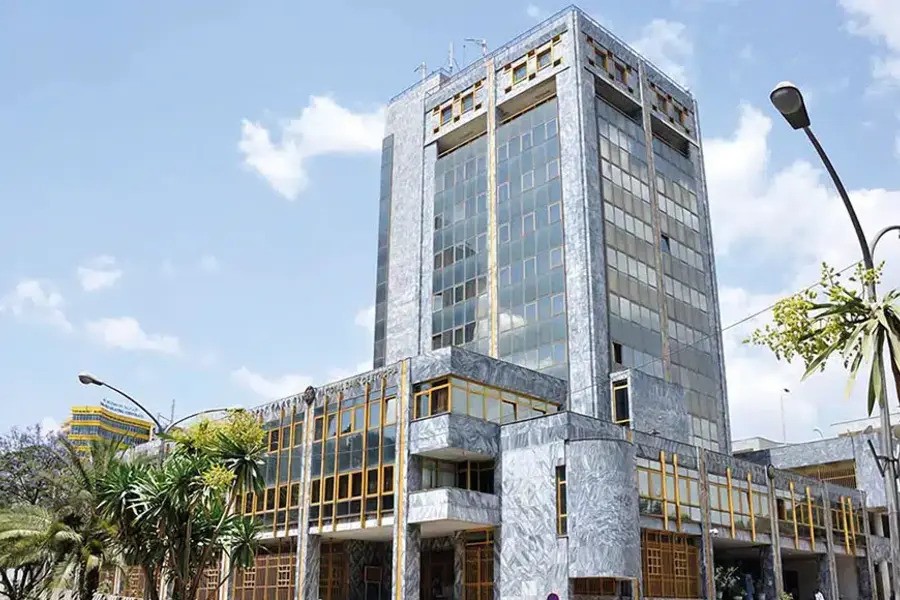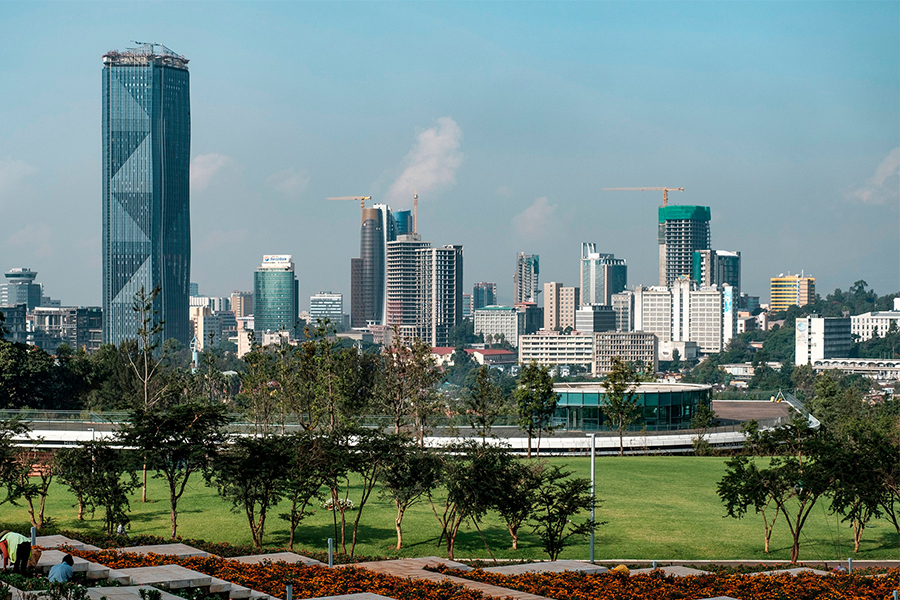
Sunday with Eden | Jun 14,2025
Ethio telecom, one of the long-standing state-owned monopolies, has publicly committed to paying dividends to individual shareholders.
Under the three-year "Next Horizon: Digital & Beyond 2028" strategy, the company plans to distribute a total of 111.3 billion Br in dividends, with 35.4 billion Br targeted for the current fiscal year. The announcement, made by CEO Frehiwot Tamiru, represents a symbolic break from the era of exclusive government ownership and signals a bid to cultivate both domestic and foreign investor confidence in the telecom sector.
“Achieving this goal, however, will require substantial effort,” said Frehiwot, unveiling her new strategy last week at the Science Museum, on Menelik II Avenue.
The company’s change in approach comes after it was converted from a public enterprise into a joint share company in June 2024, following the revised Commercial Code. It offered 10pc of its shares to domestic investors, selling 10.7 million ordinary shares over a 121-day window. A total of 47,377 citizens took part in the offering.
In total, 100 million shares were put on sale at 300 Br each, with investors allowed to buy between 33 and 3,333 shares. According to company data, 712 investors bought between 3,001 and 3,333 shares, while 33 investors purchased shares at the lowest bracket.
Despite the enthusiasm, shares have yet to be formally certified by regulators more than 10 months after the public offering closed. Frehiwot disclosed to Fortune that certification is expected soon, but until then, new shareholders will not be eligible to receive dividends.
The delay has left many investors frustrated and sparked a broader debate about the credibility of the emerging capital market.
Dakito Alemu (PhD), an associate professor of finance at Addis Abeba University and one of the more than 47,000 shareholders, has become a vocal critic of the process. He cited the Ethiopian Capital Market law for stipulating that shareholders get recognised as owners within three months and are eligible to receive profits soon after.
“Instead, our money has been tied up for months,” Dakito said.
He argued that Ethio telecom continues to use investors’ funds without bearing interest.
“If that is the case, we should either consider it a loan and receive interest, or the company should pay dividends by allocating shares to the remaining subscribers,” he said.
Dakito called the company’s claim that shareholders are “not yet owners” illogical and unlawful.
“We fulfilled our obligations, paid, and registered, yet the company has failed to make us legal owners,” Dakito said. "ECMA has failed to defend investor rights. It should have intervened to defend our rights. This lack of enforcement damages trust in the emerging capital market.”
Citing the Commercial Code, Dakito argued that if shares are not allotted or funds are not refunded within the required timeframe, the company should return the money with interest at the effective market rate.
“If shares aren't legally allocated to investors who paid ten months ago, who will receive 2024/25 dividends? Shareholders deserve answers,” Dakito said.
Segni Ambaw (DVM), a veterinarian and another shareholder, echoed those concerns. He reckoned that Ethio telecom's prospectus clearly stated that investors would be recognised as legal owners within three months. Segni believes shareholders should receive dividends in the fiscal year ending 10 months later.
“What is happening now undermines our confidence,” Segni said. “I invested with high hopes, but now question the credibility of the market itself. I have serious doubts about the viability of the entire capital market.”
Tilahun Girma, a financial policy analyst and country manager at PKF Global, applauded Ethio telecom for the share sale but criticised the company for failing to certify shareholders and distribute dividends. He called the delay inappropriate and possibly unlawful.
“Since the number of shareholders is manageable, the company should have formally made them owners and issued their certificates," he told Fortune. "Dividend benefits should start accruing three months after purchase.”
He suggested the inaction may be deliberate, intended to withhold profits, and accused the ECMA of violating its own law by remaining silent. “By law, shareholders should have been recognised and paid profits within three months. ECMA’s inaction undermines both the law and investor confidence,” he said.
According to Tilahun, shareholders could have earned better returns by keeping their funds in banks, arguing that investors have lost ownership rights, the opportunity to share in profits, the right to participate in assemblies, and the ability to be represented. He warned that the situation erodes Ethio telecom’s reputation, raises doubts over the appetite for remaining shares, and could discourage foreign investors.
Tilahun urged shareholders to organise and file formal complaints with ECMA and, if ignored, to take the matter to court.
Attempts by Fortune to obtain comment from the Authority have gone unanswered.
Despite the regulatory standoff, Ethio telecom has reported robust financial results. In the fiscal year ended last month, the company generated revenues of 162 billion Br, a nearly 75pc jump from the previous year, achieving 99pc of its annual target. It disbursed 12 billion Br in dividends to the federal government, although it did not clarify whether these came from current profits or reserves.
The company is targeting 235.8 billion Br in revenue for the current year, a 45.6pc increase, and expects 40pc of income to come from non-traditional services. Contributions from the internet and voice are projected to account for nearly half of revenues, with international services, device sales, enterprise offerings, Telebirr, infrastructure sharing, and other services making up the rest.
Telebirr, Ethio telecom’s mobile money service, is forecast to grow its user base by 14pc to 62.5 million, with transaction values expected to reach 4.43 trillion Br and transaction volumes to hit 1.94 billion. Revenue from Telebirr is projected at 8.5 billion Br, nearly double the amount from last year. It is projected to hit 75 million users, processing 21.3 trillion Br in transaction value and 10.4 billion in volume. Its revenue alone is expected to reach 49.1 billion Br, with nearly one million merchants and 840,000 agents.
Ethio telecom also aspires to get an EBITDA margin of 47.7pc, a financial metric that measures a company's operating profitability as a percentage of its total revenue. Its pre-tax profit of 76 billion Br is projected to exceed three times last year’s total, with a profit margin of 22.6pc. The company expects to contribute 70.9 billion Br in taxes and 35.4 billion Br in dividends this year. Over the next three years, it anticipates revenue of 842.3 billion Br, representing a 154pc increase from the previous three-year period.
Its total assets are projected to reach 851 billion Br, with foreign currency revenue at 976 million dollars. Tax contributions over the period are forecast at 253 billion Br, with dividend payouts reaching 111.3 billion Br.
However, these are plans pundits say pinned on hope rather than realism.
"Hope is not a strategy," Aminu Nuru, a financial expert based in Doha, Qatar, posted on his Facebook page. "Unrealistic and overstretched plan brings more harm than good. Stakeholders find it difficult to take it seriously. It makes [the strategy] meaningless."
Frehiwot, speaking at last week’s press briefing, sought to shift the conversation to the broader strategic goals of the company. According to her, the new plan is about more than continuity, aiming to redefine Ethio telecom’s role in shaping the digital future of Ethiopia and extending inclusive growth across Africa. The company wants to become “globally competitive, regionally diversified, and digitally empowered."
The CEO attributed Ethio telecom’s role in supporting the Digital Ethiopia initiative to its network, customer base, acquisition capacity, and growing portfolio of services spanning from connectivity and fintech to cloud, data centres, cybersecurity, and smart cities.
By 2028, Ethio telecom plans to expand 4G LTE Advanced coverage to 85pc of the country, launch services in 550 additional towns, and build 1,228 new mobile sites, including 322 in rural areas. The company also intends to roll out 5G in 10 more cities, increasing the number of sites from 315 to 490, and boost capacity by 7.6 million to reach 112.4 million subscribers. Ethio telecom expects to reach 100 million customers by the end of the three-year strategy, including 67.3 million mobile broadband and 1.6 million fixed broadband users.
PUBLISHED ON
Aug 30,2025 [ VOL
26 , NO
1322]

Sunday with Eden | Jun 14,2025

Radar | Dec 25,2023

Fortune News | May 07,2022

Fortune News | Aug 11,2024

View From Arada | Jul 27,2024

Delicate Number | Jun 21,2025

View From Arada | Jun 04,2022

Radar | May 27,2023

Commentaries | May 24,2025

Fortune News | Jul 17,2022

Dec 22 , 2024 . By TIZITA SHEWAFERAW
Charged with transforming colossal state-owned enterprises into modern and competitiv...

Aug 18 , 2024 . By AKSAH ITALO
Although predictable Yonas Zerihun's job in the ride-hailing service is not immune to...

Jul 28 , 2024 . By TIZITA SHEWAFERAW
Unhabitual, perhaps too many, Samuel Gebreyohannes, 38, used to occasionally enjoy a couple of beers at breakfast. However, he recently swit...

Jul 13 , 2024 . By AKSAH ITALO
Investors who rely on tractors, trucks, and field vehicles for commuting, transporting commodities, and f...

Oct 11 , 2025
Ladislas Farago, a roving Associated Press (AP) correspondent, arrived in Ethiopia in...

Oct 4 , 2025
Eyob Tekalegn (PhD) had been in the Governor's chair for only weeks when, on Septembe...

Sep 27 , 2025
Four years into an experiment with “shock therapy” in education, the national moo...

Sep 20 , 2025
Getachew Reda's return to the national stage was always going to stir attention. Once...